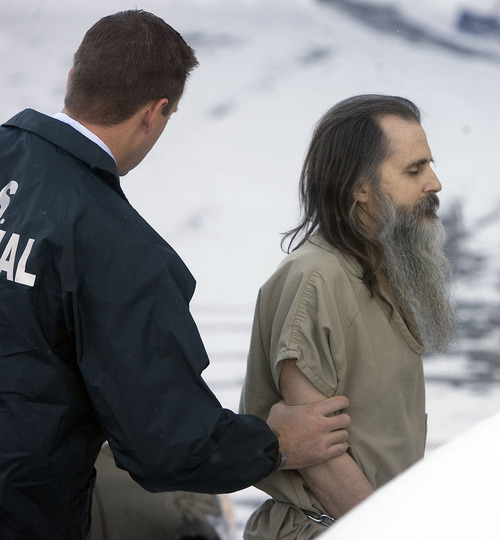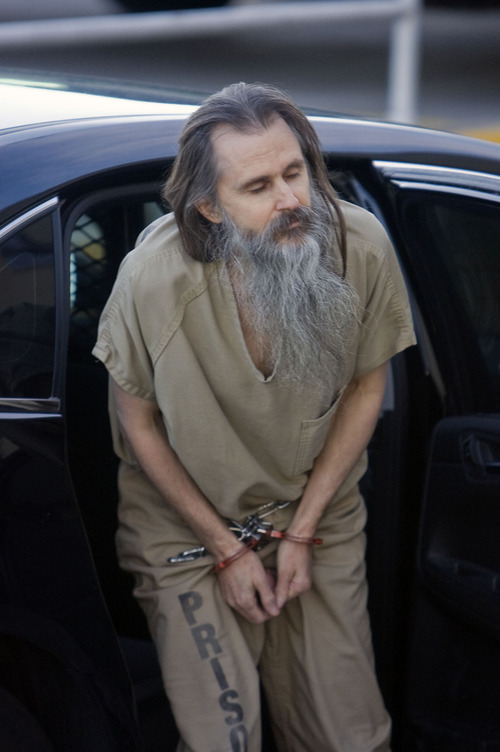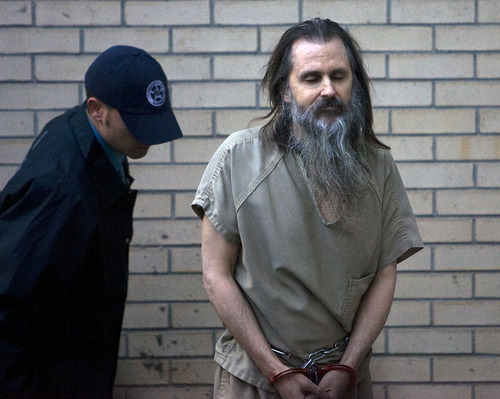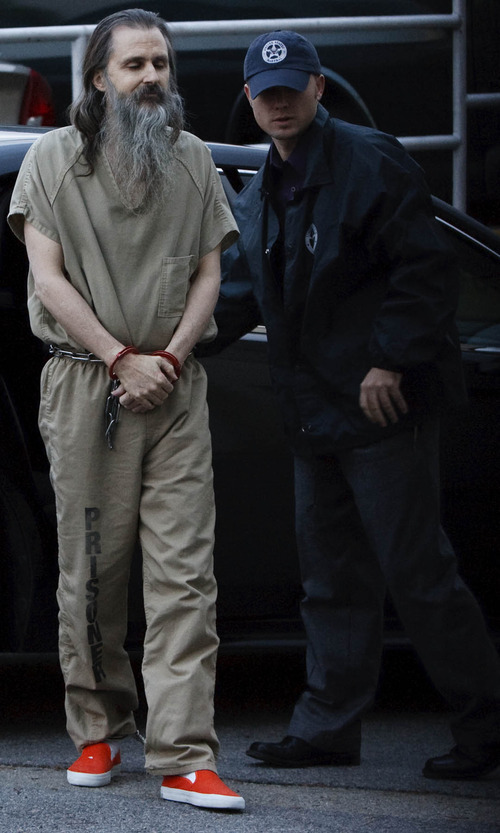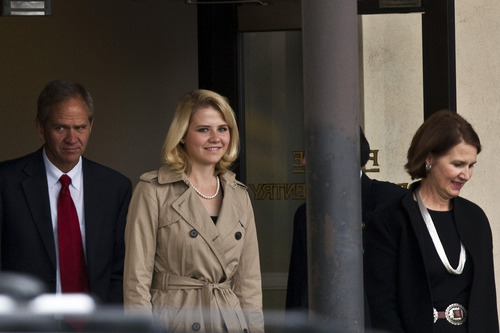This is an archived article that was published on sltrib.com in 2010, and information in the article may be outdated. It is provided only for personal research purposes and may not be reprinted.
The most sensational portions of Brian David Mitchell's kidnapping and sexual assault trial may be over, but evidence still to come will go to the heart of Mitchell's insanity defense.
The upcoming mental health witnesses — beginning Monday in federal court and continuing for up to two weeks — could have a powerful influence on the jury's verdict.
During previous testimony, jurors have heard from victim Elizabeth Smart, wife Wanda Eileen Barzee and a handful of Mitchell's family members. Those witnesses told them about the defendant's sometimes stormy upbringing, his "divinely inspired" and self-serving revelations, and his alleged knife-point abduction of then-14-year-old Smart.
Jurors also heard that Mitchell allegedly raped Smart almost daily for nine months after he took her to his mountain campsite above Salt Lake City to become his plural wife.
Using that contextual backdrop to Mitchell's life and religious philosophy, defense attorneys — followed by prosecutors on rebuttal — will now delve into the self-proclaimed prophet's psyche and try to explain his motives.
Mitchell's defense team claims he had a mental illness that is grounded in his preoccupation with religion, and that he did not know the difference between right and wrong when he kidnapped Smart from her Salt Lake City home in June 2002.
They want jurors to find Mitchell, now 57, not guilty by reason of insanity.
But prosecutors claim Mitchell was driven solely by his desire for sex, alcohol and money. They say he repeatedly demonstrated a cool and calculating ability to lie, hide out and change his appearance to avoid detection during Smart's captivity, which included a journey to California and back.
They want jurors to find the defendant guilty of kidnapping and taking a minor across state lines to engage in sexual activity.
Depending on the verdict, Mitchell could end up in prison or a secure mental health facility.
Thus far, jurors have seen little of the defendant. Because Mitchell refuses to stop singing while in the courtroom, the judge has ejected him every morning within about a minute of the jury's arrival.
For the first two weeks of the trial, Mitchell sang a variety of religious hymns. Last Tuesday, he began singing verses from Christmas songs, including "Hark the Herald Angels Sing," "Oh, Come, All Ye Faithful" and "Away In a Manger."
But jurors also have seen video of Mitchell lying to a judge in San Diego to avoid the serious consequences of a church break-in. While watching another video recording, they watched Mitchell skillfully fend off questions from a police officer and an FBI agent during a two-hour interview after the defendant was arrested in Sandy in March 2003 with Barzee and Smart.
The second half of Mitchell's trial is expected to look much like last year's two-week competency hearing, which led U.S. District Judge Dale Kimball to find Mitchell mentally competent to stand trial.
Many of the same experts and other witnesses who testified at the competency hearing are slated to take the witness stand at Mitchell's trial.
That testimony, which included a number of non-experts relating their observations of Mitchell, indicated he does not sing with any regularity outside of the courtroom.
Experts who could be called at trial by the defense include:
—
Paul Whitehead • a psychiatrist and clinical director at the Utah State Hospital, who testified during the competency hearing that while he was "skeptical of behavior [singing] that occurs in court and not elsewhere," he had taken no official stand on whether Mitchell was mentally competent to stand trial.
Whitehead, however, diagnosed Mitchell as having a delusional disorder, complicated by substance abuse and a personality disorder.
He said observation during a three-year period at the hospital showed Mitchell's illness was genuine, adding that Mitchell was "fairly inept" at "malingering," or faking a mental illness.
—
Richart DeMier • federal Bureau of Prisons psychologist, testified at the competency hearing that the content of Mitchell's religious beliefs — much of which is shared by both mainstream and fundamentalist Mormons — was not terribly bizarre. DeMier added that Mitchell qualifies as mentally ill because he equates himself with Jesus Christ or God.
Both Mitchell and members of the LDS Church believe the world will end with a cataclysmic battle between good and evil. But Mitchell believes he will play a major role in the outcome of that end-time battle, DeMier said.
DeMier has diagnosed Mitchell with paranoid schizophrenia, and said there are grandiose and persecutory aspects to his illness.
The prosecution's witness list includes:
—
Michael Welner • a New York psychiatrist who testified at the competency hearing that Mitchell is a pedophile who brainwashed Barzee during their years together and brainwashed Elizabeth Smart to a degree.
Welner said Mitchell was faking a psychiatric illness to avoid responsibility for his crimes. He called Mitchell a manipulative psychopathic liar with an antisocial personality disorder, who is callous, sadistic and irresponsible.
The psychiatrist noted that Mitchell gave blessings to his wife, Barzee, to placate her when she became angry because he was ignoring her and having sex with Smart.
Welner also pointed to Mitchell's intelligence and ability to control situations, such as the time he convinced a police officer at the Salt Lake City Main Library that Smart was someone else.
Referring to Mitchell's March 2003 questioning by both a police officer and an FBI agent, Welner noted that the defendant "dispatches questions … like a matador."
Welner has been a controversial figure in the case because he was paid approximately $500,000 by the government for his opinion and research into the case.
—
Noel Gardner • a psychiatrist and medical director of South Valley Mental Health, testified at the competency hearing that Mitchell's singing is part of a religious persona he has "cunningly and shrewdly" developed to disrupt court proceedings.
Gardner said the singing is a typical response from Mitchell when he can't win an argument or control a situation.
"Mister Mitchell is not genuinely religious," Gardner said. "He turns on the religion when it's useful and he'll turn it off when it's not useful."
Gardner said Mitchell was not preoccupied with religious ideas once he was placed at the Utah State Hospital for evaluation and treatment. Mitchell, instead, spent time with books, movies and television programs that had nothing to do with religion, including "Charmed," a TV show about three witches, he said.
Brian David Mitchell's trial resumes
The trial of Brian David Mitchell resumes Monday in Salt Lake City's U.S. District Court. Visit sltrib.com for updates on the trial throughout the day.


